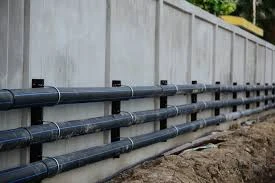nov. . 10, 2024 13:23 Back to list
Understanding CPVC Chemical Pipes for Efficient Industrial Applications and Benefits
Understanding CPVC Chemical Pipes A Comprehensive Overview
In a world where durable and reliable piping solutions are more critical than ever, CPVC (Chlorinated Polyvinyl Chloride) chemical pipes have emerged as a leading choice for various applications. This innovative material combines the advantages of traditional PVC with enhanced capabilities, making it an ideal solution for transporting chemicals, water, and other corrosive substances.
What is CPVC?
CPVC is a thermoplastic with a high degree of chlorine compared to standard PVC. The chlorination process increases its resistance to heat and chemicals, which allows CPVC pipes to withstand temperatures up to 200°F (93°C). This makes them suitable for a wide variety of industrial applications, particularly in sectors such as plumbing, chemical processing, and wastewater management. CPVC pipes are often recognized for their yellow color, which differentiates them from the standard white or gray PVC pipes.
Key Advantages of CPVC Pipes
1. Chemical Resistance One of the most significant benefits of CPVC pipes is their outstanding resistance to various chemicals, including acids, alkalies, and salts. This makes them highly effective for transporting aggressive substances that would corrode or degrade traditional piping materials.
2. Temperature Tolerance CPVC can operate efficiently at higher temperatures compared to standard PVC. This characteristic is invaluable in applications where hot water or chemicals are involved, reducing the risk of deformation or failure.
3. Longevity and Durability CPVC pipes have a long service life, often exceeding 50 years with proper installation and maintenance. They are resistant to the effects of ultraviolet (UV) radiation, which can help maintain their structural integrity when exposed to sunlight.
4. Lightweight and Easy to Install CPVC pipes are lighter than metal alternatives, which simplifies transportation and installation. This reduces labor costs and also minimizes the risk of injury during installation due to the weight of the materials.
5. Cost-Effectiveness While the initial cost of CPVC may be higher than standard PVC, the long-term savings in maintenance, repair, and replacement can make CPVC a more economical choice in many scenarios.
cpvc chemical pipe

Applications of CPVC Chemical Pipes
CPVC chemical pipes are widely used across multiple industries, including
- Chemical Processing Due to their superior chemical resistance, CPVC pipes are ideal for transporting a wide range of chemicals, including corrosive liquids and gases.
- Water Treatment Facilities These pipes are often used in systems responsible for transporting and treating potable and wastewater, where resistance to corrosion and chemicals is paramount.
- Industrial Piping Systems CPVC is widely used in factories and plants where steam and hot water are regularly present. Its high-temperature tolerance makes it a reliable option for various industrial applications.
- Fire Sprinkler Systems CPVC has gained popularity in fire protection systems due to its resistance to high temperatures and flames, providing an effective solution for fire safety.
Installation Considerations
When installing CPVC piping systems, it is crucial to follow specific guidelines to ensure optimal performance. Proper joint installation is essential, as the strength of CPVC piping systems largely relies on the efficiency and integrity of the joints. Users must also consider the pipe's expansion due to temperature changes—knowledge of thermal expansion and appropriate spacing can prevent potential issues down the line.
Conclusion
In summary, CPVC chemical pipes offer a plethora of advantages that make them an indispensable resource for various industries. With their impressive chemical resistance, temperature tolerance, durability, and cost-effectiveness, they stand out as a reliable option for transporting fluids under adverse conditions. Whether in chemical processing, water treatment, or industrial applications, CPVC pipes are shaping the future of piping solutions. As industries continue to seek efficient and sustainable materials, the demand for CPVC chemical pipes is likely to grow, further cementing their role in modern infrastructure.
-
Durable Glossy PVC Rigid Sheet | Premium High-Shine Panels
NewsAug.26,2025
-
Durable PP Rigid Sheet: Lightweight, Chemical Resistant Solutions
NewsAug.21,2025
-
PVC Grey Sheet for Extraction: Chemical Resistant & Durable
NewsAug.19,2025
-
Durable PVC Pipe Fittings for Plumbing & Irrigation Needs
NewsAug.18,2025
-
HDPE Steel Belt Reinforced Spiral Corrugated Pipe | High Strength
NewsAug.17,2025
-
HDPE Pipe Fittings: Durable, Leak-Proof Solutions
NewsAug.16,2025

